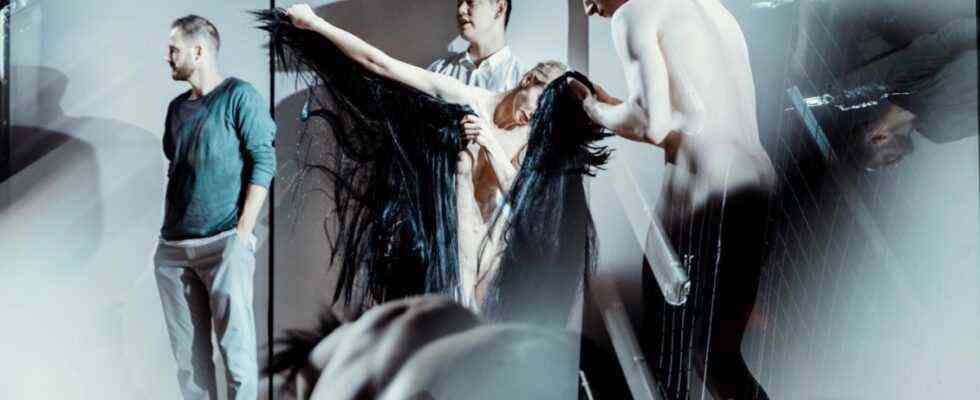At the International New Drama Festival (FIND) at the Berlin Schaubühne, a large window opens onto the world. The previous festival edition had to be canceled due to the pandemic, and the international theater exchange largely came to a standstill in the lockdown. FIND now provides the antidote to the self-provincialization of the theater and very different answers to the question of whether and how it can show the state of the world. That was radically personal and angry at the beginning with the Russian director Kirill Serebrennikow, with the British author and director Alexander Zeldin it is no less radical in a quiet way.
Zeldin, one of the prominent directors of contemporary theater in France and England, is still almost unknown in this country. After his guest appearances at the Wiener Festwochen, he is making his German debut with “Love”. The scenario couldn’t be more bleak: the corridor of a temporary dormitory of the social welfare office with a shabby communal kitchen and a single toilet for the eight residents in their narrow rooms. A family of four, a man with his old mother, a shy Syrian with a crippled leg, a single woman who only laughs when she talks to her children on the cell phone. Zeldin does nothing more than watch these people try to preserve remnants of dignity and hope.
Sober empathy: Alexander Zeldin’s “Love” is set among people who have slipped socially in the hallway of a temporary dormitory.
(Photo: Nurith Wagner-Strauss)
Careful gestures of approaching alternate with demarcation, because one does not want to make common with the other people who have slipped. The bitterness discharges in helpless outbursts of anger after petitions to the offices. The neighbors’ disgust when the old woman cannot hold her bowel movement gives way to compassion, shame and horror at how hardened in this place is. The toilet roll is carried to the toilet like a carefully guarded personal property, not even that can be shared.
Alexander Zeldin’s staging of the socially declassed is oppressive – and it is warm-hearted
This is what is left of people from the lower middle class four decades after Thatcher’s neoliberal regime: inmates of shabby shelters who have to get their Christmas dinner from a grocery table, canned vegetables and biscuits that have expired. The eviction after a rent increase was enough to flush the small family to this end of the line. The old woman and her clumsy son keep talking about going to the sea again. But of course they know that it will never happen again.
Zeldin does not show the usual theatrical freakshow of the outclassed, but rather polite petty bourgeoisie who have always obeyed the rules. Only the rules weren’t made for her. Alexander Zeldin’s theater of sober empathy can do without dramatic escalation, social kitsch or accusation slogans. His staging, which is best described with an old-fashioned word: warm-hearted, is all the more oppressive. In the 90 minutes of the performance you get to know Emma, Paig, Jason, Colin, friendly, exhausted people who can expect no great help from a broken welfare state, but a lot of humiliation. So much for the risks and side effects of Western societies.
It is more intense further east. In Moscow, Kirill Serebrennikow, one of Russia’s most important theater artists, answered his years of house arrest with a sarcastic staging: “Outside”. House arrest, the arbitrary punishment of a judiciary that has degenerated into a political instrument of power, has now been lifted, and the director is still not allowed to travel abroad. Serebrennikov is not inclined to be mocking that the authorities consider him a “thief”, a “fagot”, an “enemy of the state”, comments his doppelganger on stage with mockery: “Sounds good.” In the isolation of his own apartment, his shadow becomes his most important conversation partner. An absurd choreography of violence emerges from the evacuation command of the police, which whirls the artist around like a toy, patters it, turns it upside down, and becomes an absurd choreography of violence – a state power that needs this is grotesque, so at the same time frightening and ridiculous.
“Outside” is reminiscent of the Chinese underground artist Ren Hang, who photographed his friends naked
In a funny fantasy of revenge, the harassed artist forces two of the policemen, obese dull cheeks, to paint each other’s penis green. The production picks up speed as it turns to the Chinese underground artist Ren Hang, a poet and photographer beyond ideology. His answer to the dictatorship: He photographed his friends naked in his apartment, preferably with large flowers in their anus and vagina – a Chinese mapplethorpe. The state responded with arrests and charges of pornography. As a homage to Ren Hang’s art, the dancers and performers recreate his photos, accompanied by a rousing techno-soul groove. On the one hand: hedonism of the more blatant, melancholically grounded kind, lost to existence. On the other hand: pure dissidence with the means of poetry.
Serebrennikov was fascinated by Ren Hang, they had arranged to meet for a job. Two days before they met in February 2017, the 29-year-old depressed poet threw himself out of the window of his high-rise apartment in Beijing. The fact that Serebrennikow dedicates a loving portrait to him with the production and carefully short-circuits his own house arrest isolation with Hang’s cool radicalism is a gesture of great respect, great perplexity and even greater anger.
© SZ / cd

